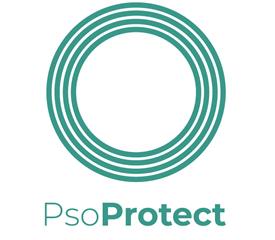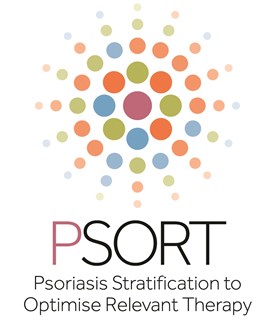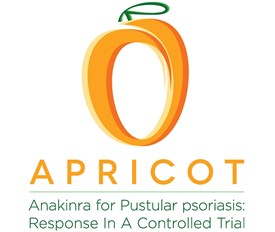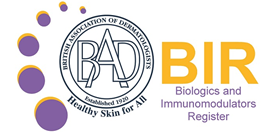Research Collaborations
The Psoriasis Association is proud of its commitment to research. In addition to funding our own research, we recognise the importance of working collaboratively with others carrying out research into this complex condition.
Please use the links below to learn more about the various psoriasis research programmes that we are involved with.
PsoProtect
The Psoriasis Association is pleased to announce its support for PsoProtect, an international registry where healthcare professionals can report outcomes of COVID-19 infection in people with psoriasis.
 PsoProtect has been set up by world-leading psoriasis researchers at Guy’s and St Thomas’ NHS Foundation Trust, King’s College London, and the University of Manchester to capture de-identified information about the outcomes and experiences of individuals with psoriasis who have had COVID-19. This will provide real world information for clinicians to help them assess risk in people with psoriasis. The registry will also help researchers to investigate whether different medicines or co-morbidities of psoriasis affect the outcome of COVID-19 infection.
PsoProtect has been set up by world-leading psoriasis researchers at Guy’s and St Thomas’ NHS Foundation Trust, King’s College London, and the University of Manchester to capture de-identified information about the outcomes and experiences of individuals with psoriasis who have had COVID-19. This will provide real world information for clinicians to help them assess risk in people with psoriasis. The registry will also help researchers to investigate whether different medicines or co-morbidities of psoriasis affect the outcome of COVID-19 infection.
This registry will provide a vital clinical and research resource to help in our collective fight against COVID-19 but please note that the registry is for clinicians to submit de-identified data, not patients. However, if you or a family member with psoriasis have had, or get Coronavirus, please do ask your clinician to submit your data to PsoProtect.
PsoProtect will publish regular summaries and insights from the registry, however, they are unable to provide information on request. The latest data can be found here.
In October 2020, the first findings from PsoProtect were published. You can find out more here.
For more information, please visit the PsoProtect website
Psoriasis Stratification to Optimise Relevant Therapy (PSORT)
Every person with psoriasis is different, and it is well known that what works for one person at any one time won't necessarily work for another. Treating psoriasis is, for most people, a process of trial and error to find the treatment - or combination of treatments - that works for them.
 The PSORT study aims to identify biomarkers found in people's DNA which will help to predict which treatments will not only work best to improve their psoriasis, but also which will work long-term and have the fewest side effects. It has been set up as the result of a £5million funding investment from the Medical Research Council (MRC) and an additional £2million contribution from industry partners. The four-year study will develop a targeted approach to treatment which could soon become reality for people with psoriasis - an approach known as stratified medicine. During the four-year study, the team will collect and evaluate comprehensive information on 7,000 patients including responses (good and bad) to biological therapies.
The PSORT study aims to identify biomarkers found in people's DNA which will help to predict which treatments will not only work best to improve their psoriasis, but also which will work long-term and have the fewest side effects. It has been set up as the result of a £5million funding investment from the Medical Research Council (MRC) and an additional £2million contribution from industry partners. The four-year study will develop a targeted approach to treatment which could soon become reality for people with psoriasis - an approach known as stratified medicine. During the four-year study, the team will collect and evaluate comprehensive information on 7,000 patients including responses (good and bad) to biological therapies.
The research team, known as Psoriasis Stratification to Optimise Relevant Therapy (PSORT) is a unique partnership between five UK universities: Manchester, King's College London, Newcastle, Queen Mary and Liverpool; 10 pharmaceutical and diagnostics companies; and the Psoriasis Association and NHS partners representing patients.
Anakinra for Pustular Psoriasis: Response in a Controlled Trial (APRICOT)
Pustular psoriasis is an uncommon but painful and often debilitating form of psoriasis. We are pleased to be involved with a new clinical trial study specifically for palmo-plantar pustulosis (pustular psoriasis of the palms of the hands and soles of the feet, otherwise known as 'PPP').
 Recent research has shown that PPP may be caused by an abnormal
pathway in the body's immune system, involving a protein called interleukin-1 (IL-1). The medication being tested - anakinra - specifically
blocks this IL-1 pathway, and this clinical trial sets out to test if it therefore improves PPP.
Recent research has shown that PPP may be caused by an abnormal
pathway in the body's immune system, involving a protein called interleukin-1 (IL-1). The medication being tested - anakinra - specifically
blocks this IL-1 pathway, and this clinical trial sets out to test if it therefore improves PPP.
As well as testing anakinra as a potential new treatment for PPP, this trial also hopes to collect information from participants that will help to explain why and how people get PPP.
APRICOT collaborators, including the Psoriasis Association, are based around the country, have been involved in the project from the beginning, and will also be instrumental in influencing the direction of the trial as part of the trial management group. This clinical trial is lead by Professor Catherine Smith at St John's Institute of Dermatology, and has been funded by the Efficacy and Mechanism Evaluation (EME) Programme, a Medical Research Council and National Institute for Health Research partnership.
In January 2020, the APRICOT trial reached its recruitment target.
British Association of Dermatologists
Biologics and Immunomodulators Register (BADBIR)
British Association of Dermatologists Biologics and Immunomodulators Register (BADBIR)
Biologic therapies are relatively new treatments for psoriasis. Though fully licensed, there is a need to analyse the long term safety of these treatments as clinical trials are conducted over a fairly short period of time.
 BADBIR is an observational study that will address this question
of long-term safety and compare it to the safety of older systemic treatments
such as methotrexate. People using biologics or systemic treatments will be
invited to join BADBIR by their Dermatologist, if they meet the inclusion
criteria.
BADBIR is an observational study that will address this question
of long-term safety and compare it to the safety of older systemic treatments
such as methotrexate. People using biologics or systemic treatments will be
invited to join BADBIR by their Dermatologist, if they meet the inclusion
criteria.
Upon joining, BADBIR will collect some general information such as demographic, overall health, psoriasis severity and treatments used. They will then confidentially collect updates on treatments, psoriasis severity and any side effects or illnesses until the study ends in 2028. BADBIR will also ask participants to complete a questionnaire about their quality of life during the first three years in the study.
This data will help to build up an overall picture of the long term safety and side effects of biologics. It will also reveal whether biologics are better, worse or the same as older systemic treatments when it comes to long term safety and side effects. This will allow people with psoriasis, and their Dermatologists, to make more informed decisions about their treatments.
For more information, please visit the BADBIR website.